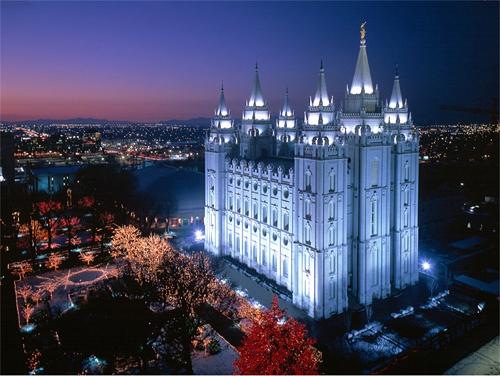Mormonism is a way of life that is practiced by members of the Church of Jesus Christ of Latter-day Saints. Over two-thirds of the church’s membership is in the United States. However, members are also located in many other countries around the world. Mormons use the Bible, the  Book of Mormon, and two other books or revelations to Joseph Smith, founder of the church. These other two revelations are the Doctrine and Covenants and the Pearl of Great Price.
Book of Mormon, and two other books or revelations to Joseph Smith, founder of the church. These other two revelations are the Doctrine and Covenants and the Pearl of Great Price.
The Mormon organization consists of a three member First Presidency and a twelve man Council of Apostles who make up the major policy-making body of the church. Mormonism’s founding doctrine was based on the assumption that Christianity was corrupt and that it was necessary to restore the “true” Christian gospel. The Mormon church sees only itself as recognized by God.
Joseph Smith founded the church in New York in 1830. He said that he had visions of God and other heavenly beings that told him to establish the restored Christian Church. He was “directed” to some thin metal plates that he translated into what is now called the book of Mormons. This book describes the history, wars, and religious beliefs of a group of people who migrated from Jerusalem to America. Smith attracted a small group of followers who settled in Kirtland, Ohio, and Jackson County, Missouri. Because of persecution, the church moved to northern Missouri, then to Nauvoo, Illinois. The people of Illinois welcomed the persecuted Mormons, and Smith began to construct a temple and a hotel there. In 1843, Smith secretly instituted the practice of plural marriage among a group of his followers. This could be because he himself had 50 wives. The Mormons lived in relative peace until 1844 when a group became mad about Smith’s practices. They started a newspaper called the “Nauvoo Expositor” and attacked him, accusing him of practicing polygamy. Smith denied this charge but was killed anyway. Brigham Young took over as their new leader. In 1852 , polygamy was officially announced at the Mormon conference.
Points of Debate
What was so wrong with their views?
* Belief in the Bible and Book of Mormon
==> How? The Mormons believe the Bible and The Book of Mormon to be the Word of God. However, the Bible states that it is the only Word of God.
==> Mormonism believes that God has a physical body. The Bible contradicts this belief
* Belief in Polygamy
==> Teach that Jesus Christ himself is a polygamist.
* Mormonism and Blacks
==> Mormonism teaches that African Americans have dark skin because they are cursed by God, and are an inferior race.
* King James Bible is Plagiarized
==> An analysis by Michael Marquard, shows that the portion of the Book of Mormon that was supposed to have been written during the Old Testament period is literally peppered with phrases and quotations from the King James New Testament.
==> The book of Mormon virtually copies the life of the Apostle Paul with its own teacher, named Alma.
* Blunders in Biblical Material
==> Peter’s paraphrase of Moses’ words in the Bible is referred to as Moses’ own words in the Book of Mormon. Thus Peter is accidentally quoted hundreds of years before the book of Acts was written or Peter had ever uttered his words.
Are their limits on acceptable beliefs in our democracy?
* Yes, but not enough
==> There are limits to keep religious beliefs from physically harming us, such as the Branch Dividians, but there are no limits on beliefs that can spiritually harm us, such as the Mormon religion.
Should we welcome and tolerate all views?
* We should listen, then judge
==> We should allow these religions to state their purpose and determine how their teachings will affect us.
==> We should not tolerate any view which is detrimental to our society or to our country.
Mormonism goes against all beliefs of the early Christian church. The Mormon Church was too radical for the people and that is why they were persecuted.
Bibliography
Allen, James B., and Leonard, Glen M., The Story of the Latter-day Saints (1976).
Arrington, Leonard J., and Bitton, Davis, The Mormon Experience (1979).
Bitton, Davis, and Beecher, Maureen, eds., New Views of Mormon History (1987).
Hansen, Klaus J., Mormonism and the American Experience (1981).
Shipps, Jan, Mormonism: The Story of a New Religious Tradition (1984).
Walters, Wesley P. Mormonism (1996).
